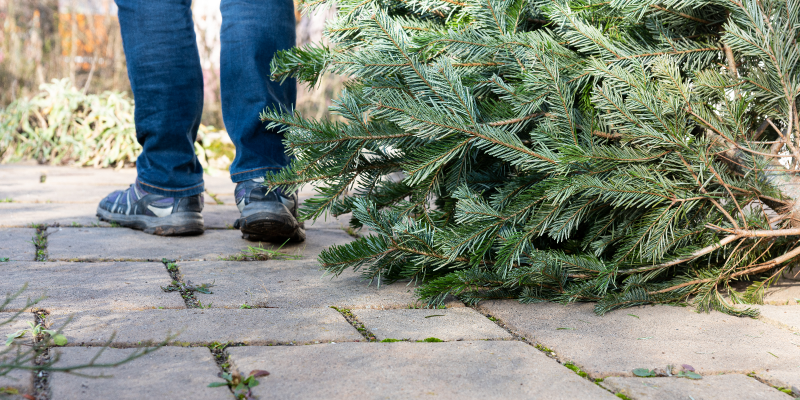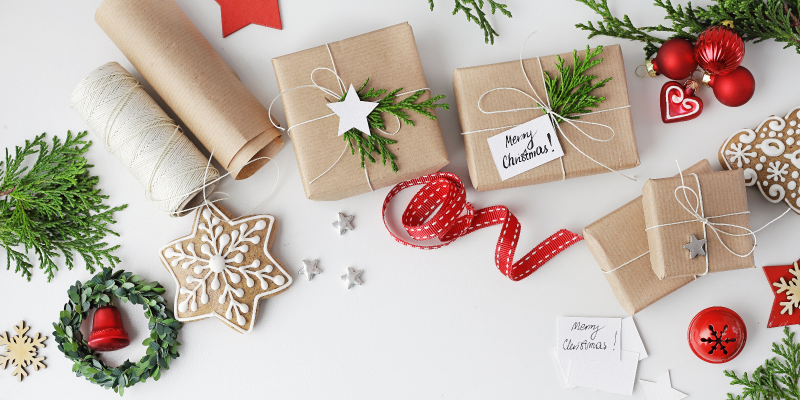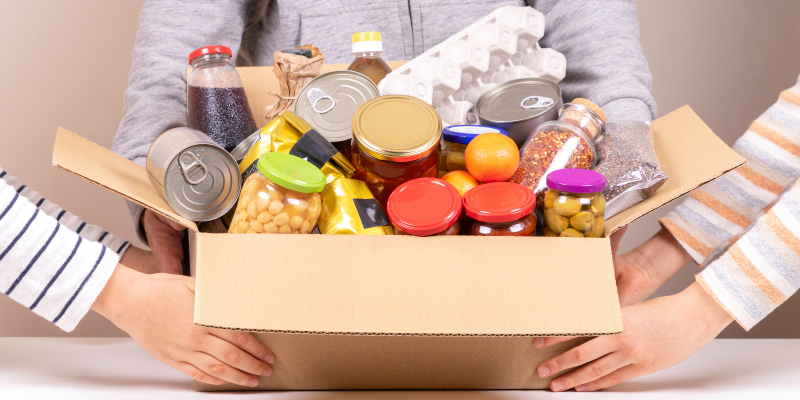This year, we are promoting kind and conscious seasonal celebrations, encouraging people to keep in mind our communities and our planet. Here are some sustainable ideas to help you spread the Christmas cheer far and wide.
1. Christmas Trees and Decorations
The most sustainable action you can take is to simply reuse what you already own so if you have an artificial Christmas tree, dust it down and put it back on show!
Although, if you do need to buy one, sustainably grown and locally sourced live trees are the most eco-friendly choice. They are a renewable resource grown on tree farms and contribute to air quality while growing. Even better, when you’re done with it, you can ‘tree-cycle’ it. If you live in Lincolnshire, St. Barnabas runs a Christmas tree recycling scheme in January. Otherwise, you can check your local authority here to find similar schemes in your area!

You can also go one step further by choosing a living tree which is by far the most ethical and sustainable option. You can either purchase or hire a real tree which after the festive season is re-potted, nurtured and re-used for Christmases to come.
When it comes to decorations, obviously reuse what you already have, but if you buy new decorations, try your best to avoid plastic and hard-to-recycle items. Instead, you can opt for wood, paper, sustainable fabrics or other natural alternatives – or why not pop into your local charity or preloved shop and see what they offer? Also, did you know you can even get reusable crackers?
2. Gifts and Gifting
A big part of Christmas is the joy of gifting. So, when you’re thinking about presents for your loved ones, pick long-lasting gifts (such as houseplants), and try your best to avoid plastic materials. Instead, you can opt for eco alternatives or even create handmade presents that will add a personal touch and are likely to be more appreciated. You could also try a zero-waste present such as an experience-based gift, subscription or membership to a charity or even adopting an animal (the latter two are great for children!).
While you are Christmas shopping, it’s always nice to support independent businesses and it can also help you cut down on greenhouse emissions if you purchase locally sourced presents. However, if you do decide to buy gifts online, you can minimise the footprint of your deliveries by choosing carbon-neutral couriers and when browsing the Internet by using Ecosia, a search engine that will plant trees on your behalf.

Packaging – There are so many packaging options available that are kind to the environment. You can choose from a range of non-plastic and reusable gift wraps, paper bags, or other recyclable alternatives; and there is even plastic-free cello tape. Christmas cards can be sustainable if you purchase glitter-free cards made from eco-friendly paper (either recycled or FSC® paper) and many cards also donate sales proceeds to charity, or why not create personalised homemade cards – a fun activity for the whole family! And the best part about paper cards is that you can easily recycle them at the end of the festive season.
Giving back - Christmas is not always a time of joy and for many people, financial and social pressures become magnified during this time. If you would like to help someone in need this festive season, you can create a ‘reverse advent calendar’ by adding a tin or package of food every day, then donate them to a local food bank. You can also include sanitary and cosmetic products, toys, clothes, and other gifts to share the Christmas spirit with others! You can find more information about how to support your local food bank at the Trussell Trust.
You could also become a Secret Santa for someone in need. There are many local and national organisations you can choose to give to.

3. Festive Food
Considering a Green Christmas also extends to what we put on our tables. Where you can, look for reduced or packaging-free options, buy locally, buy produce that’s in season, and reduce food waste. Reducing waste starts with only buying what you need, then composting and recycling, and where you do have anything left over think about donating any non-perishable items to a food bank.
It turns out that, despite our Christmas traditions, the most sustainable food alternatives are vegetarian and vegan options, due to lower carbon emissions from production. So why not get creative and swap at least one dish or dessert with a plant-based option? BBC Good Food has lots of great recipes to choose from. Alternatively, you can even sponsor a turkey instead of eating one!
We hope you find these tips insightful and useful. With a little imagination and creativity, we can have all the festive fun while reducing the environmental impact of the holiday season!
If you try any of these sustainable options, we would love to hear about them! Why not tag Ruddocks on social media to show us your #GreenChristmas


